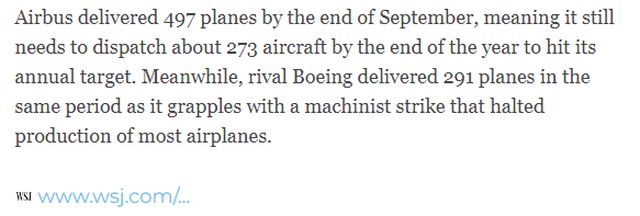- within Law Department Performance topic(s)
- with readers working within the Insurance industries
"It was the best of times; it was the worst of times..." in A Tale of Two Cities, Dickens may have contrasted Paris and London, but in the aerospace industry, a modern-day tale is unfolding in Seattle (Boeing's backyard) and Toulouse (an anchor for Airbus). And, unbelievably, this story of the marketplace rivals isn't fiction.
Airbus Delivering Strong Results
Airbus announced its earnings on Tuesday and delivered above analyst expectations for both revenues and earnings, posting a 22% year-over-year increase in net profit. Aircraft deliveries totaled 497 aircraft through the first three quarters or roughly an average of 55 per month. For Airbus to achieve its current forecast of 770 deliveries for the year, the company needs to dramatically pick up the pace in Q4 and deliver another 273 aircraft, or 91 per month.
This appears to be a challenging target, given supply chain factors have governed output throughout the year and don't show any signs of improving in the near term. The engine supply is particularly fraught, as Pratt & Whitney is still struggling with production and quality issues related to the Geared Turbo Fan.
Boeing's Performance by Comparison
Meanwhile, Boeing posted a $6 billion loss during Q3 and has delivered 291 during the first three quarters of 2024. It's hard to contemplate a more stark difference in performance given the market conditions.
The Plot Continues with a High Demand for Aircraft
Airbus reaffirmed its robust production rate forecast of:
- (75) A320 single-aisle aircraft per month in 2027,
- (4) A330 wide-body aircraft per month in 2024, and
- (12) A350 wide-body aircraft per month in 2028.
These are truly astonishing rates of production and, if achieved, will supersede previous production records set in 2018. The plans put Airbus on a path to produce more than 1,100 commercial aircraft in 2028, depending on how production ramps up on the smallest aircraft in the Airbus fleet, the A220.
For Boeing, the good news is that demand for commercial aircraft is as strong as ever and the long-term growth rates remain very attractive. Can the company put the strike, quality, and production issues behind them and get back to delivering exceptional aircraft at high rates or is Airbus going to make their market share gains permanent? One thing is for certain, refocusing the corporate culture on engineering excellence, manufacturing execution, and collaborative supply chain management will be the keys to Boeing's success.
The content of this article is intended to provide a general guide to the subject matter. Specialist advice should be sought about your specific circumstances.



